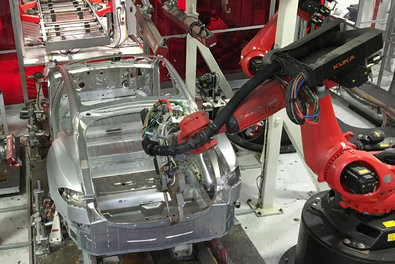
Easing the Pain of Automation
Globalization and trade agreements have been blamed for costing millions of Americans well-paying jobs. But a far greater force in the gutting of middle-class life in the United States has been automation, which has replaced well-paid workers with robots and digital platforms. The greater efficiency fuels economic growth, produces cheaper products and makes life’s task easier. But in the process, many are left poorer and less secure. What can be done to limit the harm and spread the benefits of automation?
* trade agreement = 무역 협정/ blame for ~ = ~에 대해 비난하다/ cost + sb + sth = ~에게 ~을 희생시키다[잃게 하다]/ gut = ~의 내부[내용물]를 파괴하다/ automation = 자동화/ replace A with[by] B = A를 B로 대신하다/ efficiency = 효율(성), 능률/ fuel = 부채질하다
 자동화의 피해를 제한하고 장점을 확산하기 위해 무엇을 할 수 있나요?
자동화의 피해를 제한하고 장점을 확산하기 위해 무엇을 할 수 있나요?
1. Invest in Technology With Social Benefits
Artificial intelligence can also expand human capabilities rather than substituting for them.
2. Lack of Demand Is the Economy’s Problem, Not Automation
If we generated more demand through larger government deficits or smaller trade deficits we would have more jobs.
3. Increase Top Tax Rates to Cut Middle-Class Taxes
Redistributing gains from beneficiaries of technology toward its victims is a reasonable way to spread the benefits of progress.
4. Incentives for Entrepreneurs and Subsidies for Low Wages
Give the economy every possible chance to create new types of good jobs, but we're far from needing large-scale wealth redistribution.
Sample Essay
Incentives for Entrepreneurs and Subsidies for Wages Can Cushion Automation’s Blows
The benefits of technological progress are extraordinarily large. Self-driving cars will restore mobility to the blind, elderly and disabled. Automated medical diagnosis via mobile phones will come to billions around the world. A world-class education on many topics is now freely available to anyone with a connected device. And so on.
But as technology advances, isn't it eating all of the jobs? A quick look at the evidence shows that it's not. The American economy is the world's most technologically advanced, yet it has seen net job growth every month for more than five years. So the robots and artificial intelligence systems aren't yet automating work faster than we're generating it.
The problem is that due to automation, globalization and other tectonic forces our job creation engine has changed. It’s no longer producing lots of opportunities for people to earn a good living by doing routine physical work (like staffing an assembly line) or cognitive work (like handling payroll for the factory). The large, stable and prosperous post-war middle class in the United States and other rich countries was built on jobs like these. They’re disappearing, and not coming back.
So what can we do? Quite a few things, actually. The first, and most important, is to give the economy every possible chance to create new types of good jobs. This means we have to create both a better supply of workers, and more demand for them. A better supply will come from de-emphasizing routine skills in education, and instead teaching students of all ages the art of not only solving problems, but also of identifying them in the first place, and of working with others to get complicated projects done.
More demand will come clearing out red tape and other barriers to entrepreneurship, bringing our infrastructure into the 21st century, making it easy for the world’s most talented and motivated people to come here to launch their companies and careers, and funding the basic research that eventually leads to breakthrough innovations and entirely new industries.
In parallel with this, it also makes sense today to support the people who are out there working but not earning high pay. The best way to do this is with a wage subsidy like the earned income tax credit. While the existing credit works, it is too small and hard to use at present and needs to be expanded and simplified.
We might someday have a super automated, labor-light economy that requires large-scale wealth redistribution via something like a universal basic income. But it’s not here yet, so let’s not get ahead of ourselves. There’s too much work to do right now.





![]() 자동화의 피해를 제한하고 장점을 확산하기 위해 무엇을 할 수 있나요?
자동화의 피해를 제한하고 장점을 확산하기 위해 무엇을 할 수 있나요? 






